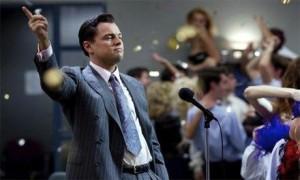
3.5/5 stars
The obnoxious and vulgar stock traders at the notorious Stratton Oakmont firm only quiet down to hear founder Jordan Belfort speak. The high-pressure traders are worthless without telephones, Belfort says, the same way an M16 assault rifle is worthless without a highly trained Marine. The traders are enraptured by Belfort’s war analogies, as if General George S. Patton will lead them into battle in a pinstripe suit and Tiffany cufflinks.
Martin Scorsese’s The Wolf of Wall Street is a bipolar epic of greed and manipulation, and like Belfort’s shady stock game, it goes on for a bit too long. Similarly to Scorsese’s gangster classic Goodfellas, the film is cleaved into two parts: a criminal ascension and a dramatic fall from grace, both fueled by illicit drugs. Leonardo DiCaprio turns in a forceful performance as Belfort, a real trader who was convicted for fraud in 1998 and sentenced to 22 months in a white-collar prison.
If Stratton Oakmont was a cult, Jordan Belfort was its leader. He begins modestly on Wall Street and is instructed by senior trader Mark Hanna (Matthew McConaughey), who explains trading as a vicious zero-sum game — money kept by investors is money lost by traders. A market downturn forces Belfortoff Wall Street and into a grimy, penny stock trading room on Long Island, where the con turns to swindling middle-class investors over the phone.
After amassing a team that includes Donnie Azoff (Jonah Hill), Belfort’s pudgy lieutenant, Stratton Oakmont rakes in millions. With piles of cocaine that would make Tony Montana blush and an endless procession of prostitutes packed onto yachts, Belfort attracts the attention of FBI Agent Patrick Denham(Kyle Chandler), who races to put down Belfort before the drugs do.
The first half of the film streaks by at a frantic and darkly funny pace. A meeting to discuss the insurance policy of a midget-tossing game is hilariously banal, and Azoff riffs on anyone who crosses him. But if those moments resemble the highs of a drug binge, the second half feels like the withdrawal. With sunken eyes, Belfort surveys the damage his lifestyle has wrought on his wife and child. His empire crumbles, and the humorous bits transform into the wailings of the entitled class.
The film’s three-hour runtime surpasses the crime saga Casino for Scorsese’s longest film yet. His best pictures are typically lengthy but are still dense and thoughtful studies of flawed characters fighting for redemption. Travis Bickle (Robert De Niro) murders his way through the New York City underworld to rescue a young prostitute in Taxi Driver. In Raging Bull, the unstable boxer Jake LaMotta (De Niro) reinvents himself after retirement. Each film has moments you wish didn’t have to end. In The Wolf of Wall Street, you wonder how many scenes of drug-fueled mischief can be strung together in three hours.
There never seems to be a moment when Belfort comes full circle to understand the depths of his widespread greed, and the film suffers because of that. His fortune is built on duping investors who trade cash for flimsy stocks, but the victims of Stratton Oakmont are never seen. Their disembodied voices are mocked and sneered on speakerphone, and the audience is invited to laugh along at their credulity. Scorsese lets Belfort off easy, and thanks to DiCaprio’s electric performance, so will many viewers.
In Goodfellas, Scorsese’s other true crime drama, Henry Hill (Ray Liotta) regrets how quickly he went from a feared gangster to a nobody in witness protection. Even today, Jordan Belfort draws in audiences who look at his crimes not as a cautionary tale, but as a model of success.
In the closing scene, Belfort ascends toward a new group of acolytes eager to hear his wisdom.That may be the biggest joke of the film — where there should be revulsion, there is respect. Where there is crime, there is unexplored opportunity.














